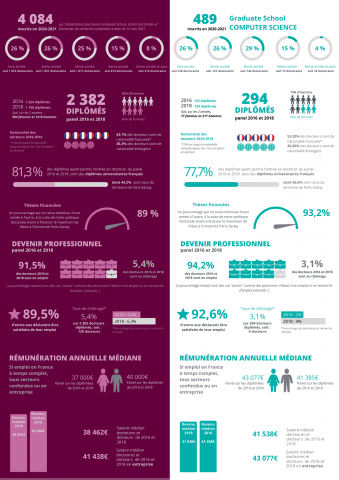
PhD Program in Computer Science - GRADUATE SCHOOL COMPUTER SCIENCE (ISN)
The programme is designed to train high-level professionals, researchers and/or developers, able to meet the challenges of the digital transformation of society:
- Challenges directly related to the field: Big Data, Artificial Intelligence, Internet of Things, Cyber-Security, Quantum Computing, etc.
- But also major societal and interdisciplinary challenges such as energy, industrial renewal, health, transportation, education and personal safety.
Algorithmics / Artificial Intelligence / Automation / Bioinformatics / Cybersecurity / Data Science / Formal Methods / High Performance Computing / Human-Computer Interactions / Image Processing / Internet of Things / Knowledge Representation / Natural Language Processing / Machine Learning / Machine and System Architecture / Networks and Telecommunications / Programming Language / Quantum Computing / Robotics / Signal Processing / Software Engineering
Content program
For this program, you will be attached to the doctoral school Sciences and Technologies of Information and Communication. (STIC)
This doctoral school brings together the skills of the main players in Information and Communication Sciences and Technologies in the doctoral space of Université Paris Saclay. It offers a unique environment in France by forming a thematic continuum in the following fields: automatic control, signal processing, image processing, robotics, networks and telecommunications, data science, learning and artificial intelligence, human-machine interaction, programming, algorithms, languages, machine and system architecture.
The ED STIC is attached to two Graduate Schools of the University of Paris-Saclay: the Graduate School of Computer and Digital Sciences and the Graduate School of Engineering and Systems Sciences.
The STIC ED is structured into three thematic poles:
- Pole A: Automation, Robotics, Signal, Images, Communications
- Pole B : Data, knowledge, learning and interactions
- Pole C: Programming, Models, Algorithms, Architecture, Networks
The e-mail addresses of the divisions and the composition of the division committees are available in the "Contact" section of the main menu.
Our in-house laboratories
- 4107 [DAVID] Données Algorithmes pour une ville intelligente et durable
- 3700 [IBISC] IBISC - Informatique, BioInformatique, Systèmes Complexes
- 4108 [LI-PaRAD] Laboratoire d'Informatique - Parallélisme Réseaux et Algorithmes Distribuée
- 5060 [LISN] Laboratoire Interdisciplinaire des Sciences du Numérique
- 3625 [LMV] Laboratoire de Mathématiques de Versailles
- 3702 [L2S] Laboratoire des Signaux et Systèmes
- 5057 [LMF] Laboratoire de Méthodes Formelles
- 5000 [LIHPC] Laboratoire en Informatique Haute Performance pour le Calcul et la simulation
- 1070 [LURPA] Laboratoire Universitaire de Recherche en Production Automatisée
- 3759 [SONDRA/CENTRALESUPELEC] SONDRA/CENTRALESUPELEC
- 3074 [SATIE] Systèmes et Applications des Technologies de l'Information et de l'Energie
- 4105 [CVN] Centre de la Vision Numérique
PhD students admitted to the PhD program will have a public law doctoral contract. The duration of the contract is 3 years. PhD students on contract are salaried full time with the sole or main mission of carrying out their doctoral project. They may also be entrusted with additional teaching, scientific mediation, promotion or expertise missions.
Possible employers* of contract PhD students in the program are :
- Université Paris-Saclay (Faculties of Science of Orsay, Medicine, Pharmacy, Sports Sciences and Law-Economy-Management)
- University of Versailles Saint Quentin en Yvelines
- University of Evry Val d'Essonne
- Centrale Supélec
- ENS Paris-Saclay
* This list needs to be completed or clarified
The doctoral project comprises:
- research training provided by the thesis director and his or her research unit,
- a complementary scientific training close to the disciplinary field of the thesis,
- a professional training dedicated to the future professional of the doctor
This training is orchestrated by the ED STIC with the support of the Maison du Doctorat of the Université Paris Saclay. The ED STIC ensures in particular the follow-up of the PhD students to guide them in their choice and the achievement of their professional project.
The partners of the ED STIC offer a wide spectrum of training through research mixing to varying degrees academic aspects and industrial issues. It is this diversity that enriches the network of actors in professional integration. Surveys show a very good rate of insertion of PhDs, whether in the industrial sector or in the academic sector.
How to be admitted to the doctoral program in Computer Science ?
Criteria for evaluating applications
-
Quality of academic training.
-
Aptitudes for research, through one or more internships in research laboratories during the previous curriculum.
-
Adequacy of the candidate's profile to the realization of the thesis project on which he/she is applying.
-
Ability to present his/her research project orally, in French or English.
-
Level in English allowing to quickly acquire autonomy in reading, writing and scientific communication at the international level.
Constitution of the application files
The applicant's file must include the following information:
- Marital status, Contact information
- Academic background, internships, professional activities
- Letter of motivation explaining the choice of the candidate for the research, for the particular project
- Research experience and scientific interests of the candidate
- Transcripts of the last two years of studies allowing access to the thesis (depending on their availability)
- Copies of diplomas obtained (or attestation if the diploma is not yet published)
- Additional document including at least a detailed CV
- Letters of recommendation
- Pre-recruitment interview report, according to the form that can be downloaded from the doctoral school's website

The criteria for evaluating candidates are as follows :
- Quality of the candidate's file (results of the Master's degree or equivalent, the candidate's aptitude for research as assessed from the internship or research thesis, recommendations from supervisors).
- Suitability of the candidate's profile for the thesis project.
- Quality of the oral presentation and mastery of the project (appropriation of the question and the approach to be implemented). These elements will be related to the time since the candidate became aware of the project.
- Conditions of supervision.
Procedure for examining applications and selecting candidates for the audition
- Opinion of the supervisors (favourable/defavourable) for each application on their subject
- Opinion of the unit directors (favorable/unfavorable) for each application in their unit.
- Possibly, pre-selection of the files by the doctoral school's pole, to retain the candidates selected for the audition on the basis of the file.
- Hearings by division.
- Pre-judging by division. The pre-judging panels are made up of the members of the cluster committees (except for the elected PhD students). The elected PhD students are invited as observers. At least one member of the management of the ED STIC (in addition to the head of the pole) attends the pole pre-jury as an observer.
- Jury of the ED STIC.
Jury
The jury is made up of the members of the ED STIC council (apart from the elected PhD students and the representatives of the ITA), plus the director of the ED STIC. It may be extended to representatives of specific calls for projects if necessary. The jury is chaired by the director of the ED STIC.
The elected PhD students and the representatives of the ITA members of the board are invited to attend the jury as observers.
Audition of candidates
Auditions can be held in French or English. Projection of documents during the presentation is highly recommended (a computer and a video projector are available).
Calendar 2024 - Candidates
- Monday April 29, 2024
Closing date for submission of thesis topics on ADUM - Monday May 13, 2024
Closing date for applications on ADUM - Between May 27, 2024 and June 4, 2024
Audition of candidates - Friday June 7, 2024
Competition results
For the supervisors
Condition of deposit of the subjects
The applicant must be affiliated to the ED STIC. He must be HDR (or benefit from an equivalence or a derogation) and belong to a laboratory affiliated to the ED STIC. The laboratory must have among its supervisors one of the institutions or components providing doctoral contracts for this competition.
A thesis director can present several subjects. He/she can submit a maximum of three applications, including a maximum of two as thesis director and a maximum of two as co-supervisor.
The thesis project must fall within the thematic scope of the doctoral school.
Calendar 20021 - Supervisors
- End of April - beginning of May: Unit directors' opinions on the subjects submitted on ADUM (favorable/unfavorable)
- Mid-May: Deadline for HDRs to fill in their opinions on the applications on ADUM (favorable/unfavorable)
- Mid-June: Transmission of the results of the competition to the doctoral college of the University of Paris-Saclay and to the referring institutions
Communication tools
THE EMPLOYMENT STATUS OF GRADUATE SCHOOL COMPUTER SCIENCE PHDS AS OF DECEMBER 1, 2019

